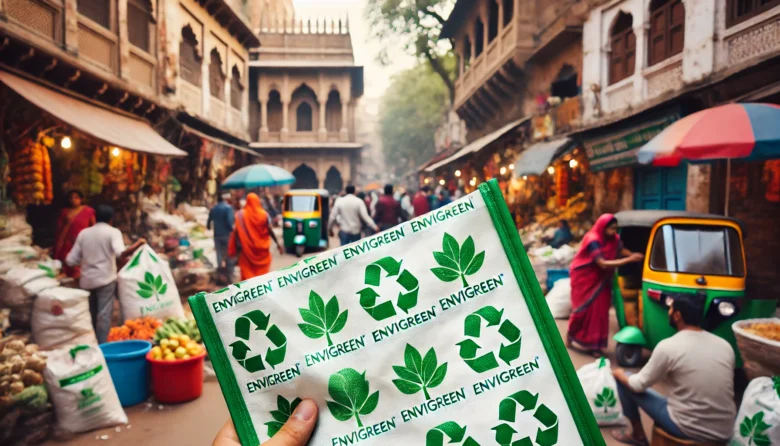Plastic waste is a massive problem in India and around the world. The issue has only escalated with our growing reliance on plastic for packaging, products, and daily use. But there’s hope on the horizon: plant-based plastics. These eco-friendly alternatives promise to reduce our reliance on traditional plastics and help mitigate environmental damage. Let’s dive into the promise of plant-based plastics and see how they could transform our future.
What are Plant-Based Plastics?
Plant-based plastics, known as bioplastics, are made from renewable plant materials instead of petroleum. They can be derived from various sources like corn starch, sugarcane, and algae. Unlike conventional plastics, which can take centuries to break down, many plant-based plastics are biodegradable and compostable, providing a more eco-friendly alternative.
The potential of plant-based plastics lies in their ability to lessen the environmental impact of plastic production and waste. By using renewable resources and offering better end-of-life options, these materials can help us move towards a more sustainable future.

Why Switch to Plant-Based Plastics?
Switching to plant-based plastics offers several benefits. First and foremost, they help reduce our dependence on fossil fuels. Traditional plastics are made from petroleum, a finite resource contributing to greenhouse gas emissions and climate change. Using plant-based materials can lower our carbon footprint and move towards a more sustainable production process.
Additionally, plant-based plastics often biodegrade faster than traditional plastics. This means less plastic waste in landfills, oceans, and other natural environments. Plastic pollution is a significant issue in India, with vast amounts of plastic waste clogging waterways and harming wildlife, so adopting plant-based plastics could make a substantial difference.
Plant-based plastics also offer the opportunity for innovative applications. They can be used in various industries, from packaging to textiles, providing a versatile solution that meets the needs of modern society while being kinder to the planet.
Plant-Based Plastics in India
India has a distinct opportunity to pioneer the adoption of plant-based plastics. With a large agricultural sector, the country can leverage its resources to produce these materials locally. Several Indian companies and startups are already exploring the potential of plant-based plastics.
Envigreen
Evergreen, a Bangalore-based company, produces biodegradable bags from natural starch and vegetable oil derivatives. These bags look and feel like plastic but decompose within 180 days. Envigreen’s products are an excellent example of how plant-based plastics can replace traditional plastic bags, reducing pollution and promoting sustainability.
BioGreen
BioGreen, another Indian company, focuses on producing 100% biodegradable and compostable products from natural ingredients like corn starch. Their range includes carry bags, garbage bags, and packaging materials. By providing eco-friendly alternatives to conventional plastic products, BioGreen is helping to reduce plastic waste in India.
Indian Institute of Technology (IIT) Madras
Researchers at IIT Madras are developing plant-based plastics from agricultural waste. By utilizing crop residues, they aim to create sustainable materials that reduce plastic pollution and provide an additional income source for farmers. This innovation could significantly impact the environment and the economy.
The Challenges Ahead
While the promise of plant-based plastics is exciting, there are challenges to overcome. One of the primary concerns is the cost. Currently, plant-based plastics are more expensive to produce than traditional plastics. This price difference can be a barrier to widespread adoption, especially in a price-sensitive market like India.
Another challenge is the infrastructure for composting and recycling. Plant-based plastics need to be disposed of correctly to have the desired environmental impact. This requires an effective waste management system to handle biodegradable and compostable materials.
Public awareness and education are also crucial. People need to understand the benefits of plant-based plastics and how to dispose of them properly. Campaigns and initiatives to raise awareness about plastic pollution and the advantages of sustainable alternatives can help drive change.
The Future of Plant-Based Plastics in India
Despite these challenges, the future of plant-based plastics in India looks promising. With continued innovation and investment, production costs are likely to come down, making these materials more accessible. Additionally, as the Indian government continues to implement policies to reduce plastic waste, there will be more support for sustainable alternatives.
The success of plant-based plastics will also depend on collaboration between various stakeholders, including businesses, researchers, and policymakers. By collaborating, they can establish a strong ecosystem that fosters the development and acceptance of environmentally friendly materials.
Conclusion
The promise of plant-based plastics offers a hopeful glimpse into a sustainable future. By decreasing our dependence on fossil fuels and offering improved disposal options, these materials can significantly help in combating plastic pollution. In India, where plastic waste is a significant concern, adopting plant-based plastics could lead to substantial environmental and economic benefits.
As consumers, we can aid this transition by selecting products made from plant-based plastics and promoting better waste management practices. We can contribute to making a significant impact and fostering a cleaner, greener world.
Author’s Note:
Thank you for reading! As someone passionate about sustainability, I believe plant-based plastics hold great promise for our future. Let’s support these innovations and work towards a more sustainable India.
G.C., Ecosociosphere contributor.
Further Reading:
- Bioplastics: A More Sustainable Future
- How Biodegradable Plastics Work




